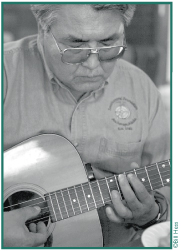|

©Bill Hess
It is not about in a
sacred manner we walk:
It is about in a
sacred manner we talk!
-Wilson Justin
|
In a Sacred
Manner
By Wilson Justin, NabiNeh
(Nabesna) Althset-any
Time is not a concept that a westerner can grasp easily.
Separation and compartmentalization seem to be so ingrained
in the minds of the descendants of the Europeans that only
slices of time seem to make sense. Athabascans, on the other
hand, grasp time well. In our mind time is or was what the
Creator brought to us for the purpose of honoring others and
ourselves in the pursuit of eternity.
Our language easily encapsulates this concept, forming a
continuum in which our everyday lives could easily be
directed, whether it be teaching, laughing, singing or even
observing silence. The struggle to translate from Indian to
English is enormous, but it is dwarfed by the struggle to
re-translate back, from English to Indian. For instance, how
would you explain in ordinary English, the following
statement: Silence is for the purpose of establishing
boundaries and used in a personal way to allow another to be
a part of the web that enfolds the moment. Here words fail
in your language...as it often fails us when we try to use
the language in context to our spoken word.
A little of this failure and frustration is evident in
the MSTC EPA tape during which Katie John expresses the wish
and need for secrecy and she quotes, "When I want to tell
secrets, no one understands what I mean...they don't listen,
they just sit around and look at me!" Here, the word
'secrecy' also means the sacred. Katie punctuates the
obvious to those who don't know the obvious and we are left
with an unexplainable gap which is both awkward to the
intended audience and devoid of meaning to the
unintended.
Obviously Katie isn't talking about secrets. Instead, she
is talking about customs. For instance, the traditions
related to Potlatches are somewhat well known, but the
custom of preparing for an impending death is not known and
is usually reserved to a select few who would be directing
the event. If Katie wishes to speak on the subject, it would
be very easy for me, for instance, or my mother, or my Aunt
Lena, or Ruby to note this and take the appropriate action.
This kind of discussion is time driven, as in, "We will now
honor our name and start the talk for our beloved's journey
on to the next life." In our Native language this is done
with just a nod or a sigh. Then the kids are removed (it is
"engii" for kids to participate in death talk).
The discussion arena gets an invisible seal around it and
the custom of talking about eternity and the emptying out
the soul to mark the solemnity begins. The conclusion both
enriches the participants and cushions the impending blow to
the expected survivors.
So what makes some customs legible and readable and
others shrouded in mystery? Well, it's all about how time is
used to deal with eternity and also who is the selected
person who opens the dialogue. The Custom to which Katie
alluded to is enacted relatively rarely, used almost
exclusively with concepts that involve death or rebirth, or
extensions of time. This discussion is very, very private
and very, very serious, sometimes with a touch of mirth but
mostly sad, in an eternal way.
Well, what's this got to do with an introduction to a
curriculum for an Alaskan State school district? Basically,
I wanted to show the impossibility of the task we undertook
when it was decided to develop this curriculum. Cruelly put,
it can't be done since our language is time derived, (or
eternity driven), whereas the English language derives its
use strictly as a function of egos and the id.
Our actions further were tempered by the fact that if we
did nothing our language was sure to die. So we were left
obviously with the choice of accepting and keeping a flawed
language or aim for purity and watching it slip away
forever. The choice was obvious and I do hope that all can
accept our choice in the flavor in which it was mixed and
then produced. I owe my teachers a heartfelt thank you for
their courage and firm beliefs that we would not let them
down. The honor roll, in no particular order, is:
|